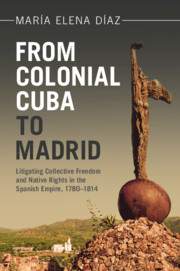 From Colonial Cuba to Madrid
From Colonial Cuba to Madrid Published online by Cambridge University Press: 14 November 2024
Chapter 5 turns to the law in action and the politics of litigation involving adjudication and interpretations of the law. The chapter opens with an examination of the Council of the Indies’ initial judgment in September 1784 on the plaintiffs’ case. Based on a narrow reading of slave law and on pro-slavery policies, the ruling rejected the plaintiffs’ controversial claim to collective freedom and to the criteria of freedom presented by the plaintiffs’ brief but allowed hearings to determine ambiguous cases and stipulated the criteria to be utilized by colonial courts in those cases. The ruling gave way to a cascade of hearings and legal actions in lower-level colonial courts and to a conflict of interpretation over the imperial ruling. Ordinary enslaved and fugitive cobreros dispersed throughout the island became direct participants in the judicial arena at this point as they directly engaged in the politics of litigation for freedom in colonial courts. The chapter shows the way imperial and colonial authorities centralized and controlled judicial outcomes but also the room for maneuvering available in some cases.
To save this book to your Kindle, first ensure no-reply@cambridge.org is added to your Approved Personal Document E-mail List under your Personal Document Settings on the Manage Your Content and Devices page of your Amazon account. Then enter the ‘name’ part of your Kindle email address below. Find out more about saving to your Kindle.
Note you can select to save to either the @free.kindle.com or @kindle.com variations. ‘@free.kindle.com’ emails are free but can only be saved to your device when it is connected to wi-fi. ‘@kindle.com’ emails can be delivered even when you are not connected to wi-fi, but note that service fees apply.
Find out more about the Kindle Personal Document Service.
To save content items to your account, please confirm that you agree to abide by our usage policies. If this is the first time you use this feature, you will be asked to authorise Cambridge Core to connect with your account. Find out more about saving content to Dropbox.
To save content items to your account, please confirm that you agree to abide by our usage policies. If this is the first time you use this feature, you will be asked to authorise Cambridge Core to connect with your account. Find out more about saving content to Google Drive.